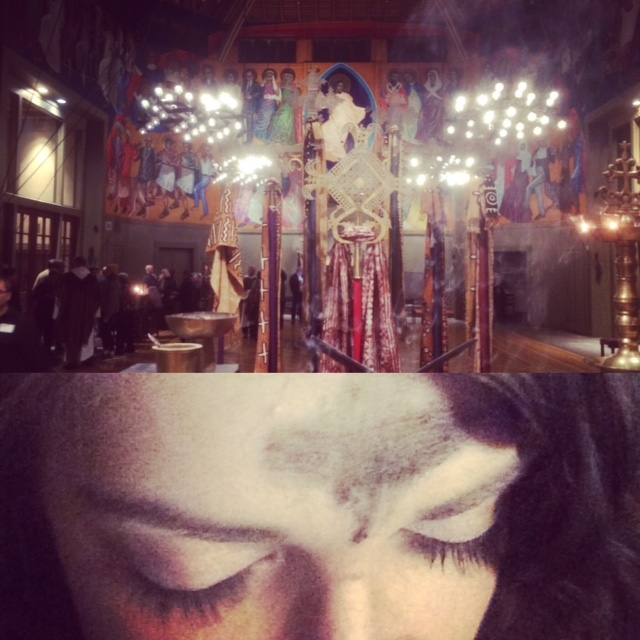ashes, ashes: what Jesus really came to save us from
Last night I went to St. Gregory's of Nyssa, the small Episcopal church a few blocks from my house. The small sanctuary was glowing with candles, and it was completely silent. People entered and silently filtered into their seats. We nodded to acknowledge each others' presence instead of greeting each other out loud. At 7 pm, the clergy silently entered, walking down to the front of the sanctuary and quietly taking their places.
A bell chimed, and then the rector stood and began to pray.
During a short ceremony, we sang, we listened to the rector reflect on the maternal image of God -- and the invitation Lent gives us to enter into the merciful, dark, quiet season of Lent, to be regenerated over the next 40 days, and to be reborn with Jesus on Easter Sunday.
We sang the Lord's Prayer. And then together, we confessed twelve sins, that included not loving our enemies, not praying enough, not caring for Creation and not loving others as we love ourselves.
The clergy handed out several small bronze bowls filled with ashes and, after the rector placed the ashes on the foreheads of the clergy, they handed out the bowls and one by one, we placed the ashes on each other. The man next to me dipped his thumb in the bowl and made a cross on my forehead as he said, "From dust you have come, to dust you shall return," words from Genesis 3 that were spoken to Adam about his mortality.
And then I took the bowl and did the same to him.
I wore the ashes for the rest of the evening.

I didn't wash my face before I went to bed last night because I didn't want to prematurely erase the reminder of what ashes symbolize. As I'm writing now, there's still a faint gray cross on my forehead.
Ashes are a symbol of how frail and finite we are.
Ashes are an outward display of grief. (When Tamar was raped by her half-brother, she tore her clothes and sprinkled ashes on her head.)
Ashes are also a public demonstration of confession and repentance. When Jeremiah (the Weeping Prophet) repented on behalf of his people, he rolled in ashes. So did Daniel, Job, the King of Nineveh, Mordecai and others in the Bible.
But I think there's one more thing they symbolize.
The ashes used for the Wednesday service come from the ashes of the branches used for Palm Sunday the year before. On Palm Sunday, when Jesus rode into Jerusalem, the people thought he was coming as the new king who would rescue them from the tyranny of the Romans. As Jesus rode through the crowd, they yelled, "Hosanna! Hosanna!"

Hosanna comes from the Hebrew "Hosai - na," which meant, "Please save me." (Adding the suffix "Na" to a word in Hebrew intensifies the emotion -- in this case, desperation -- of it.) The word evolved into Hosanna, which came to mean, "Praise God, we have been saved."
Jesus was coming to save them, but not in the way they expected -- or, in the end, wanted. He wasn't coming to overturn their political system and restore them to power.
He was coming to rescue them from their spiritual suffering, and restore them to their loving God from whom they had long been estranged.
A week later, the same people who cheered Jesus in the streets led him to his death, and jeered at him as he was dying an agonizing death, hanging bloodied, bruised and naked on a cross.
Palm branches turn to ashes.
Hosanna turns to How dare you.
Our hearts turn from the Life and Love we're offered in God, and crave political power, physical possessions and greedy gain instead.
Ash Wednesday's ashes represent that we are Finite. Grieved. Repentant. And Fickle.

Unfortunately, palm branches didn't just turn to ashes once, two thousand years ago. They still do.
We still want a Jesus who will lead -- or at least endorse -- a singular political party.
We still want a God who will galvanize a majority, give us the rights we demand, and lead us to an election night victory.
Jesus calls us to be meek, but we want to be mighty.
Jesus calls us to be peacemakers, but we pick fights instead.
Jesus calls us to hunger and thirst for righteousness, but instead we crave the opportunity to demonstrate that our narrow-minded views ARE right.
Jesus says that those who mourn will be comforted -- but we skip the mourning and go straight to comforting ourselves with huge homes and flat screen TV's and fast food and ginormous cars that get 12 miles to the gallon.
We claim to be Christians, we wave our palm branches at Jesus, we say he's the one to save us. But in the end, we reject Jesus and throw our fronds in the flames of our selfish, egotistical, mean hearts.
We want saving from other ideas, other people, outside threats and anything that threatens our comfortable way of life.
But Jesus didn't come to save us from any of that.
The faint cross on my forehead reminds me this morning that what Jesus came to save us from...
...was ourselves.
